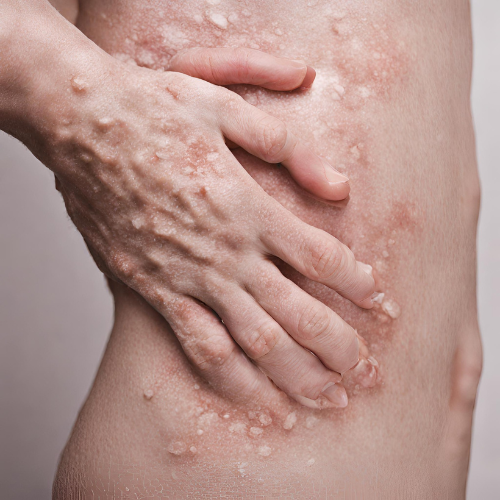Understanding Eczema: Types, Symptoms, Causes, and Treatment
What is Eczema? Eczema, also known as atopic dermatitis, is a chronic inflammatory skin condition characterized by red, itchy, and inflamed patches of skin. It is a common condition that can affect people of all ages, from infants to adults. Eczema is often associated with other allergic conditions, such as asthma and hay fever, and it tends to flare up periodically, with symptoms ranging from mild to severe.
Types of Eczema:
- Atopic Dermatitis: The most common type of eczema, characterized by dry, itchy, and inflamed skin.
- Contact Dermatitis: Caused by contact with irritants or allergens, leading to redness, itching, and sometimes blistering of the skin.
- Seborrheic Dermatitis: Affects areas of the body with high oil production, such as the scalp, face, and upper chest, causing red, scaly patches.
- Nummular Dermatitis: Characterized by coin-shaped patches of irritated skin, often triggered by dry skin, insect bites, or skin injuries.
Symptoms of Eczema:
- Itching: Intense itching is a hallmark symptom of eczema and can lead to scratching, which exacerbates inflammation.
- Redness: Affected areas of skin may appear red or inflamed, especially during flare-ups.
- Dryness: Eczema-prone skin tends to be dry, rough, and scaly, with a tendency to crack or peel.
- Rash: Eczema can cause a rash of small, raised bumps, which may ooze or crust over if scratched.
- Thickened Skin: Chronic scratching and rubbing can lead to thickened, leathery skin in affected areas.
Causes and Risk Factors:
- Genetics: Eczema has a strong genetic component, with a family history of allergic conditions increasing the risk.
- Immune System Dysfunction: Dysfunction of the immune system plays a role in the development of eczema, leading to an exaggerated inflammatory response to triggers.
- Environmental Triggers: Exposure to irritants such as harsh soaps, detergents, fragrances, or allergens like pollen, dust mites, or pet dander can trigger eczema flare-ups.
- Skin Barrier Dysfunction: Impaired skin barrier function, which allows moisture to escape and irritants to penetrate the skin, contributes to eczema development.
Diagnosis: Diagnosis of eczema is typically based on a thorough medical history, physical examination, and evaluation of symptoms. In some cases, a skin biopsy or allergy testing may be performed to rule out other possible causes of skin irritation.
Pathophysiology: Eczema is characterized by an abnormal immune response in the skin, leading to inflammation, itching, and the development of characteristic skin lesions. Dysfunction of the skin barrier allows allergens and irritants to penetrate the skin, triggering an inflammatory cascade involving immune cells and cytokines.
Pharmacological Treatment:
- Topical Corticosteroids: Corticosteroid creams or ointments are commonly used to reduce inflammation and itching during eczema flare-ups.
- Topical Calcineurin Inhibitors: Tacrolimus and pimecrolimus are immunosuppressive medications that can be applied topically to reduce inflammation and itching in eczema.
- Moisturizers: Regular use of moisturizers helps hydrate the skin and restore the skin barrier, reducing the risk of eczema flare-ups.
- Antihistamines: Oral antihistamines may be prescribed to help relieve itching and improve sleep quality during eczema flare-ups.
Non-Pharmacological Treatment:
- Avoiding Triggers: Identifying and avoiding triggers such as harsh soaps, fragrances, or allergens can help prevent eczema flare-ups.
- Proper Skincare: Gentle skincare practices, including using mild cleansers, avoiding hot baths or showers, and patting the skin dry instead of rubbing, can help maintain skin hydration and reduce irritation.
- Wet Wrap Therapy: Applying moisturizer to damp skin and covering it with wet wraps can help hydrate and soothe inflamed skin during severe flare-ups.
Conclusion: Eczema is a chronic inflammatory skin condition characterized by red, itchy, and inflamed patches of skin. While there is no cure for eczema, various treatment options are available to manage symptoms and reduce flare-ups. Understanding the triggers, symptoms, and treatment options for eczema is essential for individuals affected by this condition to effectively manage their symptoms and improve their quality of life. By adopting proper skincare practices, avoiding triggers, and following a personalized treatment plan, individuals with eczema can minimize flare-ups and maintain healthy skin. If you suspect you have eczema or experience persistent symptoms, it is essential to consult a healthcare professional for proper diagnosis and management.




